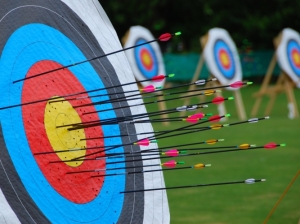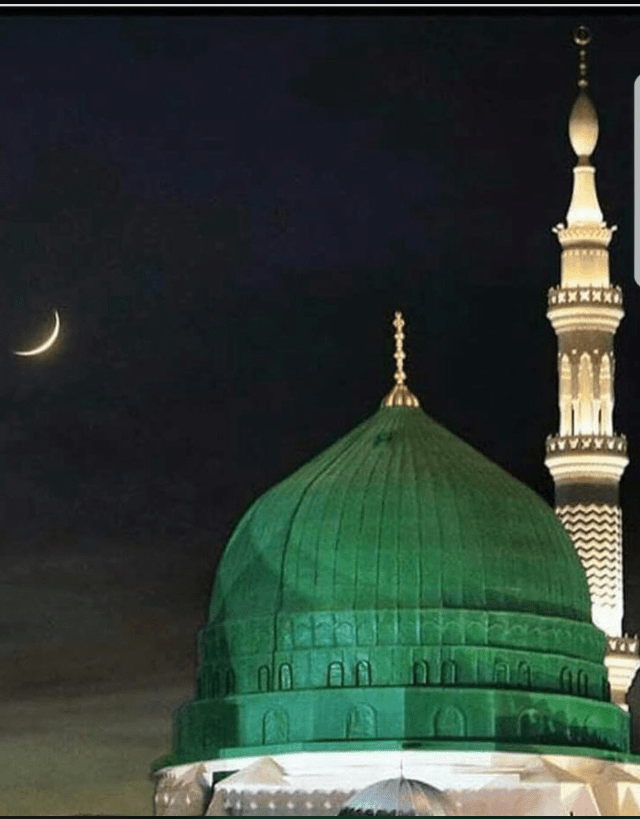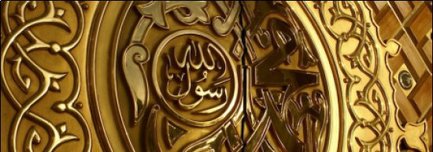 1 From the collection of Sahih Muslim
1 From the collection of Sahih Muslim
On the authority of `Uqbah bin `Amr, may Allah, exalted be He, be well-pleased with him, who said, “I heard The Holy Prophet, peace and blessings of Allah Almighty upon him, say while he was delivering a sermon from the pulpit – minbar,
“Prepare to meet them with as much strength as you can afford,
verily, strength lies in archery,
verily, strength lies in archery,
verily, strength lies in archery.’”
and the Messenger of Allah has spoken in Truth
2 From the collection of Sahih Muslim
On the authority of `Uqbah bin `Amr, may Allah be well-pleased with him, who said,
“I heard the Holy Prophet, Allah’s peace and blessings be upon him, say
“Lands will be thrown open to you and Allah will suffice you against their evil, but none of you should give up sporting with his arrows, and you shall know.’”
and the Messenger of Allah has spoken in Truth
3 Selected by at-Tabarani
On the authority of Sa’d ibn Abi Waqqas, may Allah’s favour be upon him, who related,
“The Holy Prophet, peace and blessings of the Almighty be upon him, said,
“You must use archery, for it is good for him who engages in warfare.’”
and the Messenger of Allah has spoken truly
4 Related by Abu ash-Shaykh and Ibn Abi Dunya
On the authority of Abu Hurayrah, Allah Almighty’s favour be upon him, from The Holy Prophet, may Allah the Exalted bless him and give him peace, who said,
“Learn the throwing of arrows, and do not be averse to it, for the area between the two targets holds a garden of the gardens of paradise.”
and the Messenger has spoken truly
5 Chosen by ad-Daylami in his Musnad
On the authority of Abu Sa’id al-Khudri, may Allah Almighty be well-pleased with him, who related that The Holy Prophet, may peace and blessings of Allah be upon him, said,
“Learn the casting of arrows and the Qur’an.”
and the Messenger of Allah has spoken truly
6 Narrated by al-Bayhaqi the Sunan
On the authority of Abu Rafi’, may Allah be pleased with him, who related, “I asked The Holy Prophet, may peace and blessings of Allah Almighty be upon him, `Do children have rights over us as we have rights?’ The Holy Prophet, peace and blessings from Allah Almighty be upon him, replied,
“Yes, the father has the same legal obligations towards his son as the son towards him.” And he said, “The rights of the son over his parent is that he should teach him writing, swimming, and the casting of arrows and that he should leave him in a good legal inheritance.’”
and the Messenger of Allah has spoken truly
7 Selected by ad-Daylami
On the authority of Jabir, may Allah Almighty be well-pleased with him, who narrated, “The Holy Prophet, peace and blessings of Allah Almighty be upon him, said,
“Teach your sons the shooting of arrows!’”
and the Messenger of Allah has spoken truly
8 Selected by Abu ash-Shaykh
On the authority of Abu Qilaba, may Allah Almighty be well-pleased with him, who narrated, “The Holy Prophet, peace and blessings from Allah Almighty be upon him, said,
“Teach your young boys both archery and swimming.’”
9 Selected by Abu ash-Shaykh and others
On the authority of al-Qa’qa bin Abi Hidr, may Allah be well-pleased with him, who said, “The Holy Prophet, peace and blessings of Allah Almighty be upon him, said,
“Dress like the Ma’d, adopt rough clothing, wear simple garments, surpass one another in jousting, and walk barefoot.’”
and the Messenger of Allah has spoken truly
10 Abu Da’ud and others
On the authority of `Uqba bin `Amr, may Allah Almighty be well-pleased with him, who related, “I heard The Holy Prophet, peace and blessings from Allah Almighty be upon him, say,
“Verily, with one arrow Allah almighty will admit three individuals into paradise :
the maker of the arrow who fashions it with good intent,
the archer who shoots this arrow and
the person who gathers it up (after it has been shot).’”
and the Holy Prophet has spoken truly
11 Selected by Abu ash-Shaykh
On the authority of Najiya, may Allah’s favour be on him, who related, “With a quiver in my hand, I was passing by an old man sitting by the gate of Bani Sulaym. He spoke to me and said, `Will you sell me the arrows you hold in your hand or not?’ I said, `I will sell it.’ And the old man said, `Verily I shall buy it, though I can no longer shoot it. Then he said to his servant girl,
`Oh slave girl, go check my quiver and tell me whether it is full up or not!
For I heard The Holy Prophet, may Allah send peace and blessings upon him, say,
“Attend to your quivers!’”
12 Related by an-Nasa’i and al-Bayhaqi
On the authority of `Ata ibn Abi Rabah, may Allah Almighty be well-pleased with him, who narrated, “I saw Khalid bin Abdullah and Jabir bin `Amru-l-Ansari, may Allah Almighty’s favours be upon them both, casting arrows. As one of them wearied, the other said to his companion, `You have grown weary of casting arrows, but I have heard these words from The Holy Prophet, peace and blessings of Allah Almighty be upon him, who said,
“Everything that is done without the remembrance of Allah (Dhikrullah) is vain distraction and idle play, but for these four accomplishments :
a man walking between the two points of the archery ground, training his horse, learning how to swim and jesting with his family.’”
and the Messenger of Allah has spoken truly
13 Reported by al-Qarrab
On the authority of Abu ad-Darda’, may Allah Almighty shower His favours on him, who narrates from The Holy Prophet, peace and blessings from Allah Almighty be upon him, who said,
“All games are idle play but three things :
the riding of horses,
the casting of arrows,
and a man playing with his wife ;
And of these the most beloved to me is the casting of arrows.”
14 ad-Daylami
On the authority of Ibn `Umar, may Allah Almighty be well-pleased with them both, from The Holy Prophet, peace and blessings of Allah Almighty be upon him, who said,
“What an excellent diversion for a man is the casting of arrows; and whoever
leaves archery after having learnt it, he has rejected a gift of grace.”
and the Holy Prophet spoke truly
15 Selected by ad-Daylami
On the authority of `Abd-ur Rahman ibn Shumasa that Qusaym al-Layth said to `Uqba bin `Amr, may Allah Almighty be well-pleased with him, as he was walking back and forth between the two targets (on the archery ground) “How is it that you keep going between these two points, whereas you are already an old man?” To this `Uqba replied, “Were I not for this world that I heard from The Holy Prophet, peace and blessings from Allah Almighty be upon him, I would not take this upon myself.” And he said, “I heard him say,
“Whoever learns archery, only to later abandon it, he is not one of us.’”
16 Selected by Abu ash-Shaykh
On the authority of Ibn `Umar, may Allah Almighty be well-pleased with them both, who narrates that The Holy Prophet, peace and blessings from Allah Almighty be upon him, once missed a certain man. The Holy Prophet, upon whom be blessings and peace, said,
“Where is that missing person?
And one of them said, “He has gone gaming.”
And The Holy Prophet, Allah’s peace and Blessings upon him, said,
“What have we to do with games!”
And one man said, “O Prophet of Allah! That man has gone to cast his arrows.”
Thereupon The Holy Prophet, peace and blessings of Allah Almighty be upon him, said,
“The casting of arrows is not one of the unlawful games; indeed, casting arrows is the very best of your pastimes.’”
17 Narrated by Abu ash-Shaykh
On the authority of Abu Hurayra, may Allah be well-pleased with him, who recalled, “The Holy Messenger, peace and blessings of Allah Almighty be upon him, said,
“The casting of arrows is a share and a characteristic of the shares of Islam.’”
and the Holy Prophet has spoken truly
18 Reported by Abu ash-Shaykh
On the authority of Abu Umama, may Allah Almighty be well-pleased with him, who said, “The Holy Prophet, peace and blessings of Allah be upon him, said,
“Men have not drawn anything but that the bow had an advantage over it, and more.”
and the Messenger of Allah has spoken truly
19 at-Tabarani
On the authority of Saiyidina Ali, may Allah Almighty be well-pleased with him, who relates, “On the morning of Ghadir Khumm The Messenger of Allah, peace and blessings of Allah Almighty be upon him, wound my turban and its end fell down upon my shoulder. Then he said,
“Verily, the Lord, exalted be His Majesty, assisted me on the day of the battle of Badr and on the day of the battle of Hunayn with angels, and they were with this turban wound in this manner.”
Then the Holy Prophet, may Allah Almighty send peace and blessings upon him, went on to say,
“Truly the turban is a barrier between the Muslims and the idolaters.”
Then he donned his armour and, while holding an Arabian bow in his blessed hand, his eye fell upon a man who had in his hand a Persian bow. The Holy Prophet, peace and blessings from Allah Almighty be upon him, said to him,
“Put that away from your hand and take this Arabian bow and these spears of metal; Allah in His exalted Majesty will then support your faith and make you firm in faith and establish you in the land.’”
20 Narrated by al-Bayhaqi
On the authority of Jabir bin Abdullah, may Allah be well-pleased with them both, on the authority of The Holy Prophet, peace and blessings from Allah Almighty be upon him, who said,
“My love necessarily goes to whoever moves back and forth between the two points (the shooting place and the target of the archery field) with an Arabian bow, not with the bow of Chosroes (Persian kings).”
and the Messenger of Allah has spoken truly
21 Related by at-Tabarani
On the authority of Abi Darda’, may Allah Almighty be well-pleased with him, on the authority of The Holy Prophet, peace and blessings of Allah Almighty be upon him, who said,
“Everyone who walks between the two points of the archery field will have
merited the reward for a good deed for every step he takes.”
and the Holy Prophet has spoken truly
22 Selected by Abu ash-Shaykh and ad-Daylami
On the authority of Abi Darda’, may Allah Almighty be well-pleased with him, on the authority of The Holy Prophet, may Allah’s peace and blessings be upon him, who said,
“Whoever removes his wrap from his shoulders and walks between the two targets of the archery field, will receive the reward for the freeing of a believing slave for every single step.”
and the Holy Prophet has spoken truly
23 Selected by Ibn Abi ad-Dunya
On the authority of Abdullah bin Jarad, may Allah be well-pleased with him, who said,
“The Holy Prophet, may Allah bless him and give him peace, liked shooting arrows between the two targets, and he used to run along with his Companions.”
24 Selected by ash-Shaykh
On the authority of Anas bin Malik, may Allah be well-pleased with him, who said, “I saw The Holy Prophet, peace and blessings from Allah Almighty be upon him, chewing a bowstring of sinew, and he firmly spliced the end of his bow with it while he was fasting on a day of Ramadan.”
and the Messenger of Allah has spoken truly
25 Selected by an-Nasa’i
On the authority of Ka’b bin Murra, may Allah Almighty be well-pleased with him, who said, “I heard The Holy Prophet, peace and blessings from Allah Almighty be upon him, say,
“Shoot! He whose arrows reaches the enemy, provided his arrow is shot in the way of Allah, Allah will raise him one level in paradise.’”
and the Messenger of Allah has spoken truly
26 Selected by at-Tabarani
On the authority of Anas, may Allah Almighty be well-pleased with him, who said, “The Messenger of Allah, peace and blessings from Allah Almighty be upon him, said,
“Whoever shoots an arrow in the way of Allah, will receive the reward of freeing a slave; and this is his ransom from the fire.’”
and the Messenger of Allah has spoken truly
27 Selected by at-Tabarani in his book `Al-Awsat’
On the authority of Anas, may Allah be well-pleased with him, who said, “The Messenger of Allah, peace and blessings of Allah Almighty be upon him, said,
“He who shoots an arrow in the way of Allah, whether it falls short or reaches its target, his reward for his arrow shall be as the reward for the freeing of four people of the sons of Isma’il, had he freed them.’”
and the Messenger of Allah has spoken truly
28 Selected by at-Tabarani in his book `al-Kabir’
On the authority of Muhammad Ibn-ul-Hanafiya, may Allah be well-pleased with him, who said,
“I saw Abu `Amru-al-Ansari, may Allah Almighty be well-pleased with him, on the day of Siffin, and he had taken the pledge of allegiance at `Aqaba and fought in the Battles of Badr and Uhud ; now he was bent over from fasting and he said to his servant boy, “Give me cover with the shield!” and the servant boy gave him cover so that he was thereby protected from his enemy whilst he drew the bowstring, weakly until he was hit by three arrows, shooting which he did not return. Thereupon he said, “I heard the Messenger of Allah, may Allah’s blessings and peace be upon him, say,
“If a person shoots an arrow for the sake of Allah and His good pleasure, regardless of whether his arrow reaches or falls short of his enemy, that shot will be a light going ahead of him on the Day of Resurrection.’”
and the Messenger of Allah has spoken truly
29 Related by al-Bukhari
On the authority of Abu Usayd as-Sa’idi, may Allah be well-pleased with him, on the authority of his father, may Allah Almighty be well-pleased with him, who said, “The Messenger of Allah, peace and blessings of Allah Almighty be upon him, said,
“On the days of Badr and Hunayn, we joined ranks against the Quraysh and they have joined ranks against us; should they subdue you, go for your arrows.’”
and the Messenger of Allah has spoken truly
30 Selected by at-Tabarani
On the authority of Hussein Ibn as-Sa’ib Ibn Abi Lubaba, on the authority of his father, may Allah Almighty be well-pleased with him, who said, “It was the eve of `Aqaba or the eve of the Battle of Badr when The Holy Prophet, on whom be blessings and peace of Allah Almighty, spoke to those of the Ansar and the Muhajirin who were with him,
“How will you fight the unbelievers on the morrow?”
And `Asim Ibn Abi-al-Aflah said in answer to this, “O Messenger of Allah, first of all, we shall take up the bow and arrows; and if they have drawn close to us, up to two hundred cubits or around that distance, the shooting of a variety of bows begins ; and when they have drawn even closer, the shattering with stones, and when they have drawn yet closer within the reach of our lances, the play of lances begins until the lances are broken ; after that comes the contest of the swords, and this is the manner of battle, O Messenger of Allah.” Upon this The Holy Prophet, upon whom peace, said,
“Thus war is revealed to the people of faith.”
then he gave the command for it and said,
“He who engages in battle with the enemy, let him fight in the manner of Asim.”
and the Messenger of Allah has spoken truly
31 Upon which all (Traditions) are agreed
On the authority of Sa’d ibn Abi Waqqas, may Allah Almighty be well-pleased with him, who said,
“The Messenger of Allah, may Allah Almighty bless him and grant him peace, supplied me with arrows on the day of Uhud and The Holy Prophet, peace and blessings from Allah Almighty be upon him, said to me,
“Shoot, oh Sa’ad, may my father and mother be your ransom!”
also on this authority, may Allah Almighty be well-pleased with him, he said, “The Messenger of Allah, may Allah Almighty bless him and grant him peace, did not join both his parents (in this turn of phrase) for anyone else before me, and I was the first to cast arrows at the unbelievers.”
and the Messenger of Allah has spoken truly
32 Related by Abu ash-Shaykh and al-Hakim
On the authority of Sa`d ibn Abi Waqqas, may Allah Almighty be well-pleased with him, “The Messenger of Allah, peace and blessings from Allah Almighty be upon him, said to me also on the day of Uhud,
“Oh Allah, guide his shot and grant his supplication”
and the Messenger of Allah has spoken truly
33 Chosen by al-Bukhari
On the authority of Salama bin al-Akwa’, may Allah Almighty be well-pleased with him, that The Messenger of Allah, may Allah Almighty bless him and grant him peace, stepped out to the people of Bani Aslam, while they were staging an archery competition in the marketplace, and he said to them,
“Shoot, ye sons of Isma’il! For verily, your forefather was an archer; and I am with the tribe of so-and-so.”
Thereupon they hesitated, and The Holy Prophet, peace and blessings from Allah Almighty be upon him, asked,
“What is it with you?”
and they said, “How shall we shoot while you are with the tribe of so-and-so?” and The Holy Prophet, peace and blessings from Allah Almighty be upon him, said,
“Go ahead, and shoot, for I am with all of you.’”
and the Messenger of Allah has spoken truly
34 Narrated by at-Tirmidhi
On the authority of Abu Hurayra, may Allah be well-pleased with him, who said, “The Messenger of Allah, peace and blessings from Allah be upon him, spoke,
“No wager is permitted except with animals having soles (khuf or hooves – hafir) or with the casting of arrows (nasl).’”
and the Messenger of Allah has spoken truly
35 Chosen by Abu ash-Shaykh
On the authority of Anas, may Allah Almighty be well-pleased with him, who said, “The Messenger of Allah, may Allah Almighty bless him and grant him peace, said,
“Whoever acquires a bow in the way of Allah, from him Allah the exalted fends off poverty and need through its blessings.”
and the Messenger of Allah has spoken truly
36 Selected by at-Tabarani in his book `As-Saghir’
On the authority of A’isha, may Allah be well-pleased with her, who said, “The Messenger of Allah, may Allah bless him and grant him peace, said,
“There is no harm for any of you to take up your bow when you are overtaken by care, and thereby do away with your worries.’”
and the Messenger of Allah has spoken truly
37 Chosen by Abu ash-Shaykh
On the authority of Abu Khirash, may Allah be well-pleased with him, who said, “I heard al-Qasim relate about The Messenger of Allah, may Allah Almighty bless him and grant him peace, that he passed by some people shooting arrows with bows, and one of the Companions said, “I see that they have not yet prayed their obligatory prayers, which would be better than what they are doing,
O Messenger of Allah.” And the holy prophet, Allah Almighty bless him and grant him peace, then said,
“Their bows are better unless they miss the prayer time.’”
and the Messenger of Allah has spoken truly
38 Chosen by Abu ash-Shaykh
On the authority of Ibn `Umar, may Allah Almighty be well-pleased with them both, who relates,
“The Messenger of Allah, peace and blessings from Allah Almighty be upon him, spoke,
“The angels witness three things:
the wager of the horse-race,
the shooting with the bow,
and the pleasantry of a man with his wife.’”
and the Messenger of Allah has spoken truly
39 Chosen by at-Tabarani
On the authority of Rafi` bin Khadij, may Allah Almighty be well-pleased with him, who related, that he went out on the day of Uhud, and The Messenger of Allah, may Allah Almighty bless him and grant him peace, wished him to return to Medina, for he thought him to be too young. But his uncle told The Holy Prophet, that Rafi’ was an archer and a teacher of archery, whereupon The Holy Prophet, on whom be blessings and peace from Allah Almighty, permitted him to come along.
and the Messenger of Allah has spoken truly
40 On the authority of Salama bin al-Akwa’, may Allah Almighty be well-pleased with him, who related, “I asked The Messenger of Allah, peace and blessings from Allah Almighty be upon him, about the permissibility of praying with the bow and the leather quiver: was this permissible or not?” The Holy Prophet, may Allah Almighty bless him and send him peace, replied,
“Pray with the bow but leave aside the leather quiver.’”
and the Messenger of Allah has spoken truly



 The city of Hijrah, a city once called Yathrib,
The city of Hijrah, a city once called Yathrib, of Islam, the resting place of al-Habeeb (SAW),
of Islam, the resting place of al-Habeeb (SAW), of mercy envelope you in the day, the black starry
of mercy envelope you in the day, the black starry  sky wraps you at night,
sky wraps you at night, bright,
bright,


 I sincerely felt like I had to explain myself constantly that no, just because it’s not so obvious, it is STILL extremely distressing, painful, and debilitating.
I sincerely felt like I had to explain myself constantly that no, just because it’s not so obvious, it is STILL extremely distressing, painful, and debilitating.




